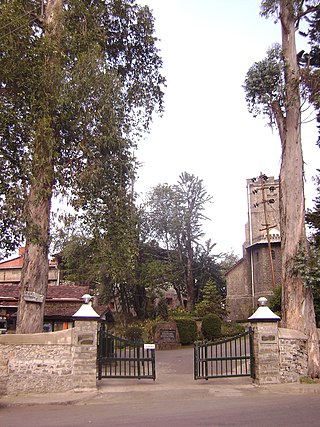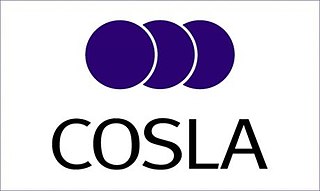Related Research Articles

Netball is a ball sport played on a rectangular court by two teams of seven players. The primary objective is to shoot a ball through the defender's goal ring while preventing the opposing team from shooting through their own goal ring. It is one of a few sports created exclusively for women and girls and remains primarily played by them, on indoor and outdoor courts, especially in schools and most popularly in the Commonwealth of Nations.

The term multiculturalism has a range of meanings within the contexts of sociology, political philosophy, and colloquial use. In sociology and in everyday usage, it is a synonym for ethnic pluralism, with the two terms often used interchangeably, and for cultural pluralism in which various ethnic and cultural groups exist in a single society. It can describe a mixed ethnic community area where multiple cultural traditions exist or a single country within which they do. Groups associated with an indigenous, aboriginal or autochthonous ethnic group and settler-descended ethnic groups are often the focus.

The Association of Southeast Asian Nations, commonly as ASEAN, is a political and economic union of 10 states in Southeast Asia. Together, its member states represent a population of over 600 million over a land area of 4.5 million km2 (1.7 million sq mi). The bloc generated a purchasing power parity (PPP) gross domestic product (GDP) of around US$10.2 trillion in 2022, constituting approximately 6.5% of global GDP (PPP). ASEAN member states include some of the fastest growing economies in the world.
A student society, student association, university society, student club, university club, or student organization is a society or an organization, operated by students at a university, college, or other educational institution, whose membership typically consists only of students and/or alumni.
The Sangh Parivar refers, as an umbrella term, to the collection of Hindutva organisations spawned by the Rashtriya Swayamsevak Sangh (RSS), which remain affiliated to it. These include the political party Bharatiya Janata Party, religious organisation Vishva Hindu Parishad, students union Akhil Bharatiya Vidyarthi Parishad (ABVP), religious militant organisation Bajrang Dal that forms the youth wing of the Vishva Hindu Parishad (VHP), and the worker's union Bharatiya Kisan Sangh. It is also often taken to include allied organisations such as the Shiv Sena, which share the ideology of the RSS.
A students' union or student union, also known by many other names, is a student organization present in many colleges, universities, and high schools. In higher education, the students' union is often accorded its own building on the campus, dedicated to social, organizational activities, representation, and academic support of the membership.

A student council is an administrative organization of students in different educational institutes ranging from elementary schools to universities and research organizations around the world. These councils exist in most public and private K-12 school systems in different countries. Many universities, both private and public, have a student council as an apex body of all their students' organisations. Student councils often serve to engage students in learning about democracy and leadership, as originally espoused by John Dewey in Democracy and Education (1917).
National Council may refer to:

Student affairs, student support, or student services is the department or division of services and support for student success at institutions of higher education to enhance student growth and development. People who work in this field are known as student affairs educators, student affairs practitioners, or student affairs professionals. These student affairs practitioners work to provide services and support for students and drive student learning outside of the classroom at institutions of higher education.

Kodaikanal International School (KIS) is a co-educational independent residential school offering education for grades P-12. It is located on 43 acres (0.17 km2) in Kodaikanal, Dindigul, Tamil Nadu, India. Kodaikanal is a hill station at 2,133 m (6,998 ft) in the Palani Hills, 121 kilometres (75 mi) northwest of Madurai.

The Convention of Scottish Local Authorities (COSLA) is the national association of Scottish councils and acts as an employers' association for its 32 member authorities.
Multicultural education is a set of educational strategies developed to provide students with knowledge about the histories, cultures, and contributions of diverse groups. It draws on insights from multiple fields, including ethnic studies and women studies, and reinterprets content from related academic disciplines. It is a way of teaching that promotes the principles of inclusion, diversity, democracy, skill acquisition, inquiry, critical thought, multiple perspectives, and self-reflection. One study found these strategies to be effective in promoting educational achievements among immigrant students.

Since the beginning of the 21st century, the media of India, and Australia, mostly in Melbourne, and Sydney, publicised reports of crimes and robberies against Indians in Australia that were described as racially motivated.
Criticism of multiculturalism questions the ideal of the maintenance of distinct ethnic cultures within a country. Multiculturalism is a particular subject of debate in certain European nations that are associated with the idea of a nation state. Critics of multiculturalism may argue against cultural integration of different ethnic and cultural groups to the existing laws and values of the country. Alternatively critics may argue for assimilation of different ethnic and cultural groups to a single national identity.

Multiculturalism in Australia is today reflected by the multicultural composition of its people, its immigration policies, its prohibition on discrimination, equality before the law of all persons, as well as various cultural policies which promote diversity, such as the formation of the Special Broadcasting Service.

The Youth Hostels Association of India (YHAI) is an organisation providing youth hostel accommodation in India. It is a member of the Hostelling International federation.

Centre for Public Policy Research (CPPR) is an independent non-profit research organization located in Kochi, India. It was established in the year 2004. It conducts professional research, integrating developments in the areas of education, livelihood, governance, urban reforms and environment. The four focus study centers are: CPPR Centre for Urban Studies, CPPR Centre for Comparative Studies, CPPR Centre for Strategic Studies and CPPR Academy.
The College of Education is one of 15 colleges at The Pennsylvania State University, located in University Park, PA. It houses the departments of Curriculum and Instruction, Education Policy Studies, Learning and Performance Systems, and Educational Psychology, Counseling, and Special Education. Almost 2,300 undergraduate students, and nearly 1,000 graduate students are enrolled in its 7 undergraduate and 16 graduate degree programs. The college is housed in four buildings: Chambers, Rackley, Keller, and CEDAR Buildings.
The Muslim Community Reference Group (MCRG) was an advisory body to the Australian federal government, set up by the Howard government, from mid-2005 to mid-2006. The board served to provide the federal government with proposals on strategies and practices to help integrate the Muslim community and to foster greater understanding towards Muslims among the general society, public institutions and governmental bodies.
South Asian Canadians in the Greater Toronto Area form 19% of the region's population, numbering 1.2 million as of 2021. Comprising the largest visible minority group in the region, Toronto is the destination of over half of the immigrants coming from India to Canada, and India is the single largest source of immigrants in the Greater Toronto Area. South Asian Canadians in the region also include significant Pakistanis, Bangladeshis, Sri Lankans, and Nepalis, all representing several different ethnolinguistic backgrounds.
References
- ↑ History & Aims Archived 16 September 2009 at the Wayback Machine
- 1 2 "Australia's Indian students vow action". 13 June 2009.
- ↑ "Levy plan targets high-risk colleges". 8 March 2010.
- ↑ "Claim that Australia top choice of Indian students given thumbs down". 14 March 2010.
- ↑ "Don't treat us as 'cash cow', say Indian rallyists - Times of India". The Times of India . 8 June 2009.
- ↑ "FISA". Archived from the original on 10 March 2010. Retrieved 15 March 2010.
- ↑ FISA history and aims